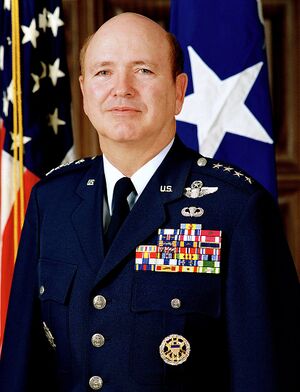Hansford Johnson
 | |||||||||||||||||||||||||
| Born | January 3, 1936 Aiken, South Carolina | ||||||||||||||||||||||||
| Alma mater | Clemson College, United States Air Force Academy, Stanford University, University of Colorado, Air Force Squadron Officer School, Army Command and General Staff College, National War College, Dartmouth College | ||||||||||||||||||||||||
Acting United States Secretary of the Navy in 2003
| |||||||||||||||||||||||||
Hansford Tillman (HT) Johnson [1] is a retired four-star general in the United States Air Force who was Acting United States Secretary of the Navy, overseeing the United States Navy and United States Marine Corps in the administration of President George W. Bush. He is the only retired Air Force officer to ever hold that position. Prior to that he was Assistant Secretary of the Navy (Installation and Environment). He currently works at the Institute for Defense Analyses.[2]
Early life and Air Force career
Johnson was born on January 3, 1936, in Aiken, South Carolina. He graduated from high school in 1953 and then attended Clemson College. He was the outstanding graduate in thermodynamics and aerodynamics from the United States Air Force Academy in 1959, received a master's degree in aeronautics from Stanford University in 1967 and a master's degree in business from the University of Colorado in 1970. Johnson also graduated from the Air Force Squadron Officer School, Army Command and General Staff College, National War College, and the advanced management program at Dartmouth College. Johnson was the first graduate of the United States Air Force Academy to achieve the rank of general.
After graduation from the Air Force Academy, he flew C-130 Hercules transports throughout Europe, Africa, the Middle East and West Asia. After completing graduate school at Stanford University, Johnson volunteered for duty in Vietnam. In 1967 he flew with the 20th Tactical Air Support Squadron as a forward air controller, and directed tactical close air support strike missions. During his tour, he flew 423 combat missions, 71 of which were over North Vietnam or the demilitarized zone. After returning from Vietnam, he was assistant professor of aeronautics at the United States Air Force Academy, and then commander of the 22d Bombardment Wing at March Air Force Base, California and on the staff of Strategic Air Command (SAC) at Offutt Air Force Base, Nebraska.
From 1982 to 1985, Johnson led a team that shifted funds around in the $100 billion annual Air Force budget, then led Strategic Air Command operations in 1985, where he directed the refueling and strategic reconnaissance forces during the bombing of Libya. Following his tour in SAC, Johnson became the vice commander of the Pacific Air Forces. In 1987, he became the deputy commander in chief of United States Central Command (USCENTCOM) at MacDill Air Force Base, Florida during Operation Earnest Will, the United States reflagging of Kuwaiti oil tankers and escort operations in the Persian Gulf. Following his tour at USCENTCOM, Johnson worked at the Chairman of the Joint Chiefs of Staff as Director of the Joint Staff.
Johnson ended his military career as the dual-hatted Commander of United States Transportation Command, the final commander of the Military Airlift Command and the first commander of the Air Mobility Command. Military forces under his command provided all airlift and special operations forces for Operation Just Cause, Operation Desert Shield and Operation Desert Storm, the movement of troops, equipment, and supplies to and from the Persian Gulf being the most concentrated movement in American military history. Johnson retired from active duty on August 31, 1992.
Later work
After retiring from the Air Force, Johnson continued to work with active and former military personnel as the vice chairman of USAA and chairman of the USAA Bank, Investment Management Company, Buying Service and Real Estate. While at USAA, Johnson was appointed by President George H. W. Bush and President Bill Clinton to the 1993 Base Realignment and Closure Commission (BRAC).
When Kelly Air Force Base was closed by the 1995 BRAC, Johnson was appointed by the City of San Antonio to serve as the chair of the Local Reuse Authority, which transformed a "closed" base into a vibrant industrial center. Subsequently, Johnson was executive vice president and chief operating officer of the Credit Union National Association (CUNA) in Madison, Wisconsin. He also was president and CEO of EG&G Technical Services and later of EG&G when purchased by The Carlyle Group.
On August 3, 2001, President George W. Bush nominated Johnson to be Assistant Secretary of the Navy (Installations and Environment), and he was sworn in four days later. The President directed him to assume the duties as the Acting Secretary of the Navy on February 7, 2003, the only Air Force officer to ever hold that position.
After leaving the Department of the Navy, Johnson became a Senior Fellow at the Institute for Defenses Analyses (IDA).
References
- ↑ Who's Who in America – 2008, 62nd Edition (pub. 2007)
- ↑ https://web.archive.org/web/20051214230430/http://www.chinfo.navy.mil/navpalib/people/secnav/johnsonht/johnsonhtbio-acting.html
Wikipedia is not affiliated with Wikispooks. Original page source here